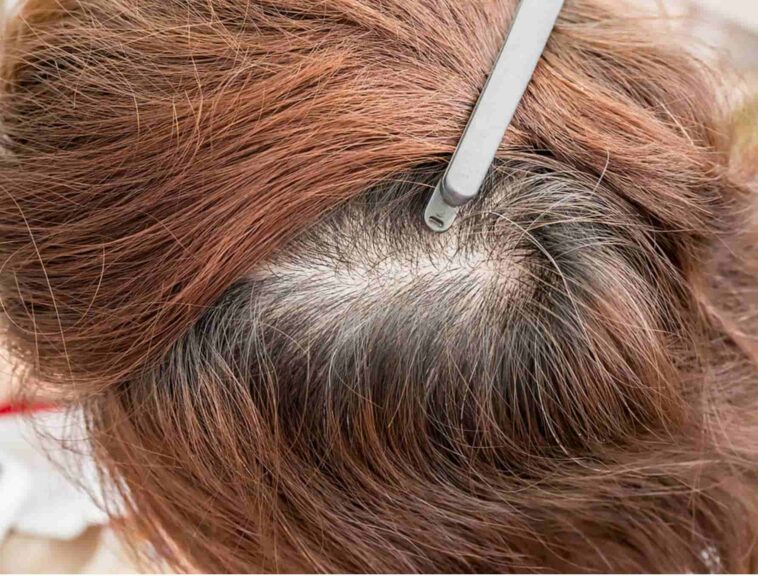If you are wondering what causes thinning hair in women, you're in the right place.
Hair thinning is defined as a minor or moderate hair loss. Unlike other forms of hair loss, thinning hair does not cause baldness. It does however make certain patches stand out due to hair thinning.
Hair thinning is a gradual process, meaning you get time to pinpoint and figure out what is triggering it and the best course of treatment for you.
What Causes Thinning Hair in Women?
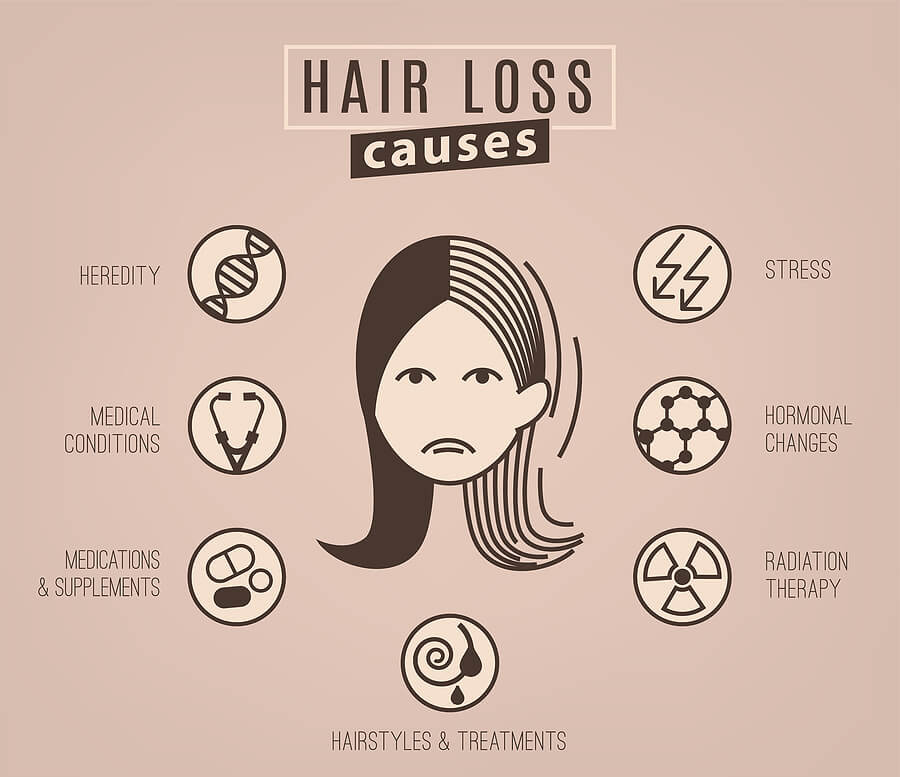
There is a range of causes that can cause thinning hair. These include lifestyle habits, genetics, or both.
Certain medical conditions can also be the cause of thinning hair in women. Hair thinning is different than hair breakage.
Commonly, the following lifestyle habits are the most known causes of thinning hair:
- Over-treating your hair with perms, relaxers, and color treatments or bleach (Check out these ways to naturally lighten your hair)
- Use of hair products with harsh chemicals such as extreme-hold hair sprays or gels.
- Ongoing coloring of your hair
- Tight updo or high ponytails tug on your hair and cause follicles to break and cause thinning spots.
- A lack of iron, folic acid, and other minerals in your diet can be a cause of hair thinning.
- If you are under stress from work or other circumstances in your life, you are likely to experience hair thinning.
Apart from this, underlying medical conditions can also cause thinning hair, such as:
- Recently had a baby
- Stopping birth control pills
- Hormonal changes
- Thyroid disorders and testosterone imbalances
- Stress hormones (high cortisol)
- Chronic inflammation
- Rapid weight loss in a short period of time (more than 20 pounds)
- Autoimmune diseases
- You suffer from immune deficiencies
- Skin disorders or skin infection
Other less common causes of thinning hair are eating disorders, pulling at your hair, and high fever.
Often thinning hair is confused with “Alopecia” which is widespread hair loss. Thinning hair eventually leads to loss of hair, but these two are not the same.
Is Thinning Hair Normal?
According to the American Academy of Dermatology (ADD), it is normal to lose 50 to 100 strands in a day. If you lose more than this, it means you are shedding more than normal.
At What Age Does Hair Thinning Start?
A single strand of hair is made with proteins and has a life of 2 to 7 years.
When a hair falls out, it is replaced by new hair. But as we age, a little hair thinning is normal as the rate of hair growth slows down.
Hair also tends to become smaller and have less pigment, and most follicles stop producing hair altogether. There is no set age for thinning hair. Most men start showing signs of hair thinning in their mid-30s, while women lose some luster and thickness after the age of 40.
Can Thinning Hair Be Due to Vitamin Deficiency?
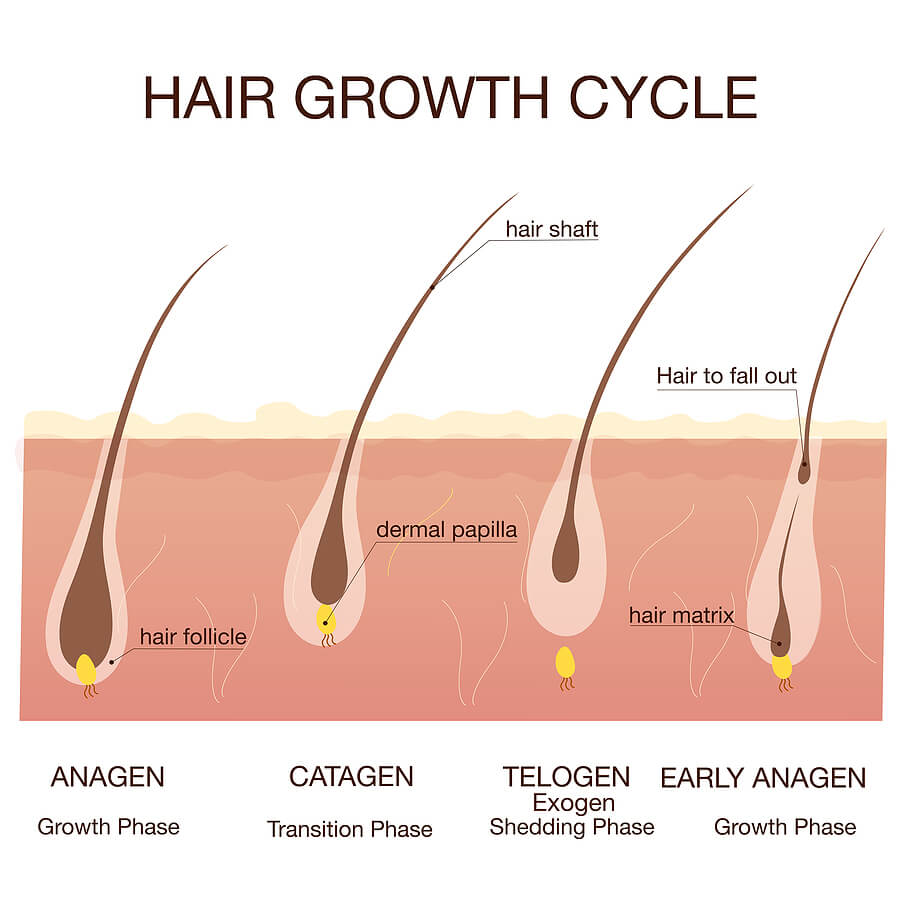
Research shows that a lack of Vitamin D in our bodies leads to hair thinning.
Vitamin D is known to stimulate new and old hair follicles for hair growth. Lack of Vitamin D can lead to stunted growth of new hair. Vitamin D is an essential nutrient needed for our overall health – it boosts immunity, strengthens our bones, keeps skin healthy, promotes cell growth, and stimulates hair follicles.
A lack of Vitamin D can be due to spending time indoors, wearing copious amounts of sunscreen, and indulging in nutrient-less foods.
The lack of Vitamin D can be easily remedied by spending more time in the sun, eating foods rich in Vitamin D, or hair care supplements.
Can Thinning Hair Grow Back Thicker?
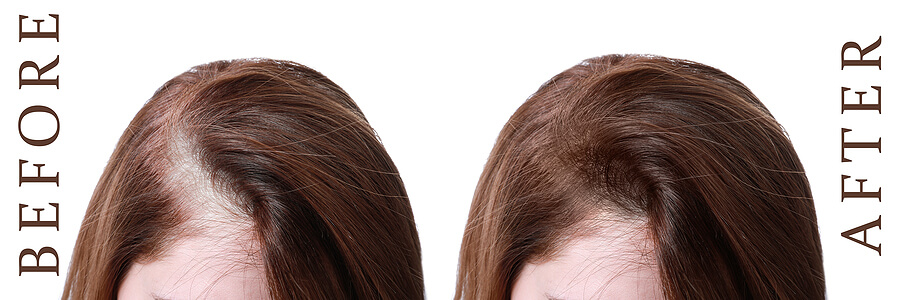
Thinning hair is not a cause of alarm and, in most cases will grow back in time with the right protocol if the reason for thinning is not genetics. Hormonal hair loss experienced during menopause and postpartum is likely to grow back.
Pregnant, menopausal, and postpartum women all have high estrogen that affects their hair growth.
Hair Loss During Pregnancy
During pregnancy, our body increases the amount of estrogen produced. The high production of estrogen stimulates and signals more follicles to enter into the growing phase of the hair growth cycle. It is why during pregnancy, you are likely to experience thicker, fuller, and lustrous locks. Hair grows significantly faster during pregnancy than at any other time in your life.
Following childbirth, the estrogen levels drop and adjust back to their previous pre-pregnancy levels. This sudden drop in estrogen prompts the hair follicles to enter the resting phase – slow hair growth. After 100 days in the resting phase, the hair begins to shed.
Hair changes in pregnancy and postpartum are common. Nonetheless, every woman experiences it differently as the changes are different. Do not panic! You will experience a full recovery, albeit the process may take a little time. Be patient.
Hair Fall During Menopause
Women in their late 40s and early 50s experience menopause – a time of extreme hormonal changes in the body. Menopause entails various symptoms, one of which is menopausal hair loss. These symptoms also include hot flashes, irritability, night sweats, insomnia, and vaginal dryness.
As women age, our ovaries begin to decrease the number of sex hormones – estrogen and progesterone – that are produced normally. As the body adapts and responds to these fluctuating hormone levels, numerous physical changes are experienced.
In short, menopausal hair loss is directly related to the reduced production of estrogen and progesterone. The drop in hormonal levels affects hair growth and hair becomes thinner.
The decrease in these two specific sex hormones also causes an increase in the activity of male hormones called androgens. The androgens cause the hair follicles on the head to shrink. This further aggravates hair loss and thinning hair.
Thinning hair due to hormonal levels is a reality for most women after menopause and postpartum. The good news is that your hair will grow back, but you can help it along the way.
What Works For Thinning Hair?
Apart from hormones, several other factors can contribute to hair thinning as mentioned above. Pinpointing the causes of thinning hair helps figure out how to remedy the loss.
So what can you do about thinning hair?
Below are some ways that allow you to have thicker, shinier hair and prevent further hair thinning.
Do Shampoos and Topical Products Work for Thinning Hair?
There are two viable options when it comes to hair growth shampoo – prescription or over-the-counter treatments.
Most prescription shampoos are anti-androgenic in nature, which means that they target the male hormones associated with hair thinning – testosterone and dihydrotestosterone (DHT).
On the other hand, over-the-counter growth shampoos contain a blend of amino acids and antioxidants that rebuild hair and reduce damage and inflammation.
If you want to invest in over-the-counter hair thinning shampoos or are looking to promote and strengthen hair growth, opt for formulas that contain antioxidants like vitamin E, B vitamins, amino acids, and ginseng. These ingredients help build hair and minimize environmental damage.
Steer clear of shampoos that contain parabens, sulfates, and fragrances.
How Important are Diet and Lifestyle?
The makeup of our hair follicles is made up of a protein called Keratin. Keratin is made of amino acids that serve as the building blocks of protein. Therefore an anti-inflammatory diet rich in proteins can help reverse hair thinning.
Best Foods to Support Hair Growth
Healthy food sources of protein include eggs, beans, nuts, fish, turkey, and chicken. Also, antioxidant-rich vegetables, and healthy fats.
Anti-inflammatory herbs and spices like turmeric, ginger, cinnamon, parsley, basil, and salad greens, when consumed there times a week can contribute to thicker, shinier hair.
If you are taking a Keto diet, make sure to eat some carbs regularly because cutting carbs for too long can reduce thyroid function.
Foods rich in Vitamin A help keep the scalp healthy and increase the rate of hair growth. It also helps with sebum production. Eat foods that have a high Vitamin A content, such as sweet potatoes, spinach, and peppers.
More on Best Foods for Healthy Hair Growth here
Lifestyle Changes can range from a holistic approach to health or incorporating certain habits that promote and stimulate hair growth, such as oiling your hair or massaging your scalp. A scalp massage is the cheapest method of getting thicker hair. You can do this while washing – apply gentle pressure with your fingertips around your scalp. It will encourage blood flow.
You can also use a scalp massager which makes this task immensely easy and removes dead skin cells as well.
Find ways to deal with your stress. Excess stress leads to an increase in inflammatory molecules that can damage hair follicles. Make it a habit to practice meditation and gratitude to calm your nervous system.
Do Vitamins and Supplements Work to Stop Hair Thinning?
It is no secret that healthy hair is dependent on your overall good health. Therefore, the addition of supplements to your diet is likely to provide more benefit than harm.
Scientists say that Vitamins A, B, C, and D, along with iron, selenium, zinc, and folic acid, are important for hair growth.
Antioxidants such as Vitamin E increase your body's production of catalase, an enzyme that can stop your hair from graying. On top of that, the more minerals you eat, the more likely you'll keep your hair color.
Bottom Line
While the process of thinning hair is a cause of alarm, it is reversible. Changes in diet and lifestyle can help promote hair growth, but as with all things, it takes a few months to see visible results no matter which treatment option you choose.
Want to learn how you can rejuvenate the thick, healthy, and beautiful hair of your youth as quickly as possible? Click here
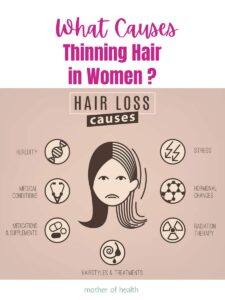
References
https://medlineplus.gov/ency/article/004005.htm
https://www.healthline.com/health/thinning-hair#causes
https://www.healthline.com/health/vitamin-d-deficiency-hair-loss
https://flo.health/menstrual-cycle/menopause/changes/menopausal-hair-loss#Will%20it%20grow%20back?
https://www.zrtlab.com/blog/archive/hormones-and-hair-loss/#:~:text=Hair%20changes%20in%20pregnancy%20are,hair%20changes%20are%20all%20individual.&text=However%2C%20unlike%20the%20postpartum%20period,hormone%20replacement%20therapy%20is%20introduced.
https://flo.health/being-a-mom/recovering-from-birth/postpartum-problems/tips-to-tackle-postpartum-hair-loss
https://www.healthline.com/health/hair-loss-prevention#1
https://www.self.com/story/thinning-hair-fuller-tips
https://www.webmd.com/connect-to-care/hair-loss/treatments-for-hair-thinning-that-really-work
https://www.elle.com/beauty/g14432639/hair-growth-loss-shampoo/

